|
|
|
Sort Order |
|
|
|
Items / Page
|
|
|
|
|
|
|
| Srl | Item |
| 1 |
ID:
144739


|
|
|
|
|
| Summary/Abstract |
Over the past 15 years, Russia’s model of political-economy has evolved around three main channels of global economic integration: 1) export of natural resources and a national system of redistribution of export revenues; 2) financialisation, acting as a boost for domestic consumption/demand; and 3) the offshore integration of Russian capital into global capital markets. The current crisis is affecting all three channels of Russia’s global political economy. Together, reduced export revenues, the deepening financial crisis and the dominance of offshore-sourced investments into Russia, serve as crisis transmission mechanisms, and thus constitute three sets of (inter-related) dilemmas for the Russian authorities. Four scenarios of possible development of the current situation are provided.
|
|
|
|
|
|
|
|
|
|
|
|
|
|
|
|
| 2 |
ID:
144736


|
|
|
|
|
| Summary/Abstract |
The “coup-volution” of 2011 removed President Mubarak but not his authoritarian regime, which is now guided by his successor, President Abd al Fattah al-Sisi. Both autocrats, there are nevertheless important differences between these two presidents and their respective regimes. Sisi’s tougher authoritarianism is analogous to the Latin American prototype of “delegative democracy”, a stalled phase of democratic institution-building in which voters delegate their authority to the president, who rules unconstrained by a balance of institutional powers. The primary feature of what in the Egyptian case might better be termed “delegative authoritarianism” is the decision-making autonomy of the president, who perceives himself as the “embodiment of the nation and the main custodian and definer of its interests”. This results in erratic, inconsistent and ineffective policymaking, which isolates the president yet more from institutions and political forces, while causing the entire polity to be suffused with a deep cynicism. Although the most probable scenario is that Sisi will continue for the foreseeable future as Egypt’s delegative dictator, as a one-man band his regime is inherently unstable and prone to coups, coup-volutions and outright revolutions.
|
|
|
|
|
|
|
|
|
|
|
|
|
|
|
|
| 3 |
ID:
144735
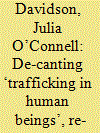

|
|
|
|
|
| Summary/Abstract |
Contemporary liberal states are eager to combat ‘human trafficking’, which state actors describe as ‘the scourge of modern slavery’ and a violation of human rights. The same states are also depriving migrants of their freedom on an unprecedented scale through immigration detention, forcibly moving them across borders through deportation, and sustaining a flourishing industry in the prevention and control of human movement. This is not a paradox. The ambition to eradicate ‘slavery’, as much as the desire to severely restrict freedom of movement, reflects a concern to preserve and extend state powers, in particular its monopoly on violence and on the control of mobility.
|
|
|
|
|
|
|
|
|
|
|
|
|
|
|
|
| 4 |
ID:
144740
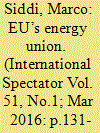

|
|
|
|
|
| Summary/Abstract |
The Ukraine crisis and subsequent tensions in relations with Russia urged the European Union to diversify its energy suppliers and integrate the energy markets of member states. However, the EU does not seem to have a clear strategy to strengthen its energy security. Member states are reluctant to relinquish control over their energy policy. Moreover, the diversification of fossil fuel suppliers may lead to new dependencies on authoritarian states, while the emphasis on unconventional energy sources may delay the development of renewables. A coordinated focus on renewable energy, coupled with investments in energy efficiency, appears to be the most forward-looking and climate-friendly way of reducing external dependencies.
|
|
|
|
|
|
|
|
|
|
|
|
|
|
|
|
| 5 |
ID:
144734


|
|
|
|
|
| Summary/Abstract |
Since 2013, the European migration and asylum regime has entered a phase of crisis, which reveals the deep interdependencies between its different components (including intra-EU mobility) and the unbalanced nature of its normative foundations. This original structural fragility had not fundamentally compromised the overall functioning of the regime until two major exogenous factors (the economic crisis, with its asymmetrical impact on the eurozone, and the wave of political instability and conflicts on the southern shore of the Mediterranean) brought its intrinsic limits to the point of rupture. The ongoing, highly contentious process of reform of the European migration and asylum regime is an unprecedented and crucially important test of the capacity of one the European Union’s key sectors to evolve under pressure and to adapt to a rapidly and deeply changing geopolitical, economic and demographic environment.
|
|
|
|
|
|
|
|
|
|
|
|
|
|
|
|
| 6 |
ID:
144732
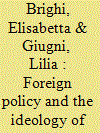

|
|
|
|
|
| Summary/Abstract |
The post-communist Italian Left has experienced a long phase of ideational misalignment between ideas placed at different levels, as a qualified discursive institutionalist approach demonstrates. Background public philosophies have often clashed with post-communist political ideology, while foreign policy programmes have often contradicted specific policies. Under the leadership of Matteo Renzi, however, the PD is now experiencing a moment of remarkable ideational consistency. Rather than being founded on entirely new premises, this new consensus folds old elements into new ones and shows all the defining traits of post-ideology. Yet, by espousing post-ideology, Renzi is making an ultimately ideological move whose limitations may soon start to show.
|
|
|
|
|
|
|
|
|
|
|
|
|
|
|
|
| 7 |
ID:
144733
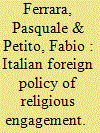

|
|
|
|
|
| Summary/Abstract |
A new awareness of the role of religion in international relations has started to inform concrete policy discussions in several Western Ministries of Foreign Affairs under the heading of ‘religious engagement’ in foreign policy. Italy is no exception, but as the country which hosts the Holy See, it represents a special case. As the approach to religion found in the historical record of Italian foreign policy shows, Italy has a comparative advantage and could well develop a unique model of religious engagement by strengthening the central structures involved in religious matters and foreign policy, as well as by using the vast network of Rome-based religious non-state actors as a forum of consultation and policy advice.
|
|
|
|
|
|
|
|
|
|
|
|
|
|
|
|
| 8 |
ID:
144737


|
|
|
|
|
| Summary/Abstract |
The survival of the Moroccan monarchy amidst the wave of protests that characterised the Arab uprisings did not come as a surprise to observers of the Kingdom. Despite the size of the protests in February 2011, demonstrators never demanded the fall of the monarchy and the king was never in danger of being dethroned. Once the King reclaimed political leadership through the launch of a constitutional reform, the protest movement faded and whatever challenge to the pre-eminence of the monarchy might have existed ended quickly. A number of explanations have been advanced for the survival of authoritarianism in Morocco, but they generally rehash conventional wisdoms about Moroccan politics that might no longer be as valid as they were in past. Less obvious factors, ranging from repressive practices to ‘de-politicisation through technocracy’ and from the complex impact of neo-liberal economics on social relations to divisions within the opposition, contributed to the survival of the monarchy.
|
|
|
|
|
|
|
|
|
|
|
|
|
|
|
|
| 9 |
ID:
144738
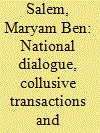

|
|
|
|
|
| Summary/Abstract |
The Tunisian political crisis that started in July 2013 was resolved thanks to the National Dialogue hosted by the Quartet who were recently awarded the Nobel Peace Prize. The ND was a collusive transaction that allowed Ennahdha to escape accountability for its political responsibility. Nevertheless, by resolving the crisis, it generated legitimacy. It also contributed significantly to the current configuration of alliances within the power circle by making possible the alliance between Ennahdha and Nidaa Tounes after the 2014 elections. The mechanisms of mutual recognition between Ennahda and Nidaa Tounes help ensure political stability by reinforcing the government’s position. However, this alliance appears to be a source of delegitimation now that the government is facing many challenges (economic crisis, security crisis and disputed political decisions). The critical situation, particularly at the security level, challenges the idea of compromise and undermines the government’s ability to make the people believe in its legitimacy.
|
|
|
|
|
|
|
|
|
|
|
|
|
|
|
|
| 10 |
ID:
144731
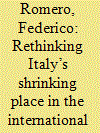

|
|
|
|
|
| Summary/Abstract |
Italy’s foreign policy is still shackled by two features inherited from its modern history: an obsessive focus on rank and prestige, and a no less delusional faith in the redemptive character of the EU and other multilateral arrangements it belongs to. The ‘middle power’ foreign policy model elaborated in the 1980s had a rationale of its own but it can hardly be adapted to the globalised world, nor can it be sustained by a deteriorated economic and societal domestic fabric. Italy has to rethink its basic national interests, adapt its foreign policy tools to new concepts of relevance and influence, and focus on a long-term, concerted effort at domestic regeneration if it is to withstand the challenges of the globalised world we live in.
|
|
|
|
|
|
|
|
|
|
|
|
|
|
|
|
|
|
|
|
|